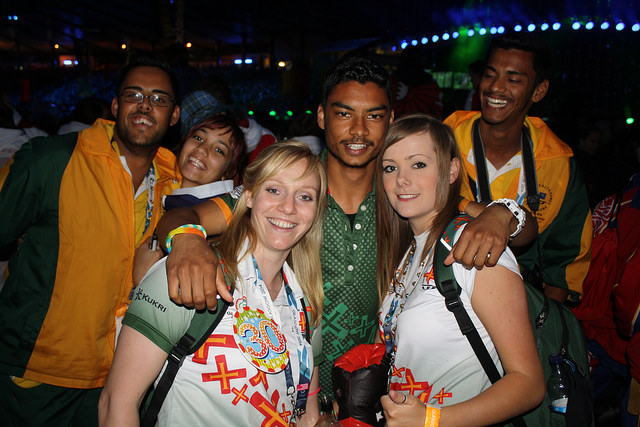"Impact of major sporting events on young people"
December 10th, 2014 International sporting events showcase athletes, but they can also promote youth engagement and physical activity at the local level writes Carl Konadu, coordinator of the Commonwealth Youth Sport for Development and Peace working group, a network supported by the Commonwealth Youth Programme.
International sporting events showcase athletes, but they can also promote youth engagement and physical activity at the local level writes Carl Konadu, coordinator of the Commonwealth Youth Sport for Development and Peace working group, a network supported by the Commonwealth Youth Programme.
Sport in itself has become a major facet of modern society; almost everyone around the world has access to sports through either playing or watching. The commercialisation of sport has seen its economic presence rise rapidly whilst its popularity and accessibility globally has followed suit. The UK sports industry is said to be 1.9 oer cent of the country’s GDP, placing sport in the top 15 sectors ahead of the motor vehicles, telecoms, legal and accounting services (Sport England 2010).
With this rise in the popularity of sport, we have also seen an increase in the demand to host major sporting events, a phenomenon some like to refer to as ‘sport diplomacy’. Countries of all economic, political and societal development levels are bidding to bring the world of sport to their borders and experience the many benefits of hosting a major games, such as increased levels of participation in sport, increased tourism, opportunities for cultural and public diplomacy as well as increased investment, which often benefits elite and grass-roots sport through the building of new stadiums and state of the art sports facilities.
However, a factor that often goes unnoticed is the effect this has on young people. The youth in all countries are integral to a nation’s development, and with the large impact that major sporting events have on society it is important to highlight what this means for young people.
Used in the correct way and incorporated into areas such as the education curriculum, extra-curricular activities and also as a part of a young person’s development, sport can help young people gain essential skills such as teamwork and communication. It can also help develop more personal skills such as confidence and leadership. However, this topic still begs the question: as a young person, what is there to gain from having a sporting event hosted in your country?
The London 2012 Games is a modern example of how a major sporting event can have a positive impact on the young people not just in the host country, but around the world. In the quest to win the bid for the London 2012 games, the message was simple; ‘choose London and we will inspire a new generation to take up sport’.
A survey through a UK Sport study established that nearly three-quarters of spectators under 25, and half of all TV event viewers under 25, felt inspired to participate in sport after being a spectator at an event (UK Sport, 2011). With viewership of major sporting events going up and diversifying through means such as social media and internet television, spectator impact could be a valuable tool for governments and stakeholders who are working to increase the physical activity of their nation, a prominent issue in Commonwealth areas in the Pacific Island states.
The Commonwealth Games 2014 is another example of a major sporting event that had a positive impact on the young people in and around the host nation. Hailed as ‘the best games yet’, Glasgow 2014 had over 15,000 volunteers who registered as ‘Clydesiders’, and the uptake of the spirit and theme of the games was abundant around Scotland. Glasgow 2014 made a conscious effort to host a sustainable event by using some already-existing stadiums for their competitions, involving the many proud Scottish people in the games through volunteering, and investing in the legacy aspect of the games before it even began. They made a strong effort to build on the games and use it as an opportunity for sustainable development within the sports sector, through initiatives such as their Community Sports Hubs. With the aim to have 150 Hubs in 32 local authorities by 2016, the young people in Glasgow are sure to benefit from these games for a long period.
2015 will be a year filled with major sporting events: the Commonwealth Youth Games in Samoa from 5th – 11th of September 2015, the first European Games will be held in Baku, Azerbaijan from June 12th – 28th 2015, the Pan American Games in Toronto from July 10th – 26th and the Central Caribbean Games in Mexico from November 15th – 30th, just to name a few.
Ultimately, it’s evident that there are ways that governments, sports organising committees and various major events stakeholders can use these spectacles to inspire and engage the young people in their nation and around the world. As the demand for major sporting events continues to grow amongst small, medium and large states, it’s important to keep in mind the opportunities these events bring for increasing youth engagement, physical activity, and creating a sense of unity within a country.
photo credit: guernseysports via photopin cc
…………………………………………………………………………………………………………………
About me: I live by the notion that ‘The World Is Yours’ and as a result you can do anything you put your mind to.
With a background of sport, I have a passion for the SDP sector as well as the governance of sport and the use of sport by governments as a diplomatic tool.
Some of my interests include the sustainable rise of Africa, financial markets and general international affairs.
…………………………………………………………………………………………………………………
Opinions expressed in this article are those of the author and do not necessarily represent the views of the Commonwealth Youth Programme. Articles are published in a spirit of dialogue, respect and understanding. If you disagree, why not submit a response?
To learn more about becoming a Commonwealth Correspondent please visit: http://www.yourcommonwealth.org/submit-articles/commonwealthcorrespondents/
…………………………………………………………………………………………………………………




